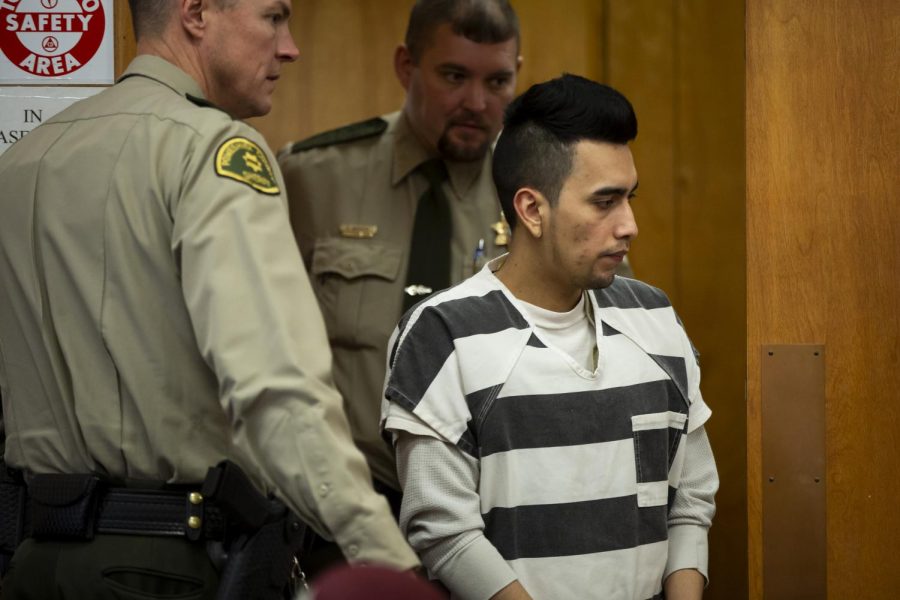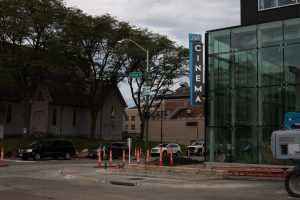Witnesses testify at evidence-suppression hearing for the man accused of killing Mollie Tibbetts
After a several-week delay, a hearing for Cristhian Bahena Rivera, the man charged with the murder of UI student Mollie Tibbetts, began with testimony from witnesses.
Cristhian Bahena Rivera appears for an evidence suppression hearing at the Poweshiek County Courthouse on Wednesday, Nov. 13, 2019 in Montezuma. Brian Powers/The Register
November 13, 2019
One witness brought to the stand in a hearing for the man accused of killing University of Iowa student Mollie Tibbetts last year testified that she did not fully read the defendant’s Miranda Rights upon his arrest.
Former Iowa City Police Officer Pamela Romero also went back and forth with defense attorneys Chad and Jennifer Frese on what she meant when she kept saying she was trying to “help” when she interviewed Cristhian Bahena Rivera, who’s charged with first-degree murder.
Bahena Rivera — who heard testimony from witnesses called by the prosecution through two interpreters — is accused of abducting and killing Tibbetts while she was on a run on July 18, 2018. After he led officers to her body in a cornfield on Aug. 21, 2018, he was charged with first-degree murder. He has pleaded not guilty.
The hearing, which will continue Thursday, is determining whether Bahena Rivera’s rights were violated during his arrest and questioning. If so, evidence obtained in violation of Bahena Rivera’s rights would be suppressed at his Feb. 4 trial.
The initial investigation
While on the witness stand, DCI Special Agent Trent Vileta said investigators spoke to many farmers and searched multiple fields. Area farmers expressed anxiety while Tibbetts was missing, he said; no one wanted to be the one who found her.
Even without Bahena Rivera guiding investigators, Vileta said he believes Tibbetts’ body would have been found once the field was harvested.
“Her shoes were like fluorescent — I feel a farmer would’ve saw her shoes first,” he said.
Investigators eventually discovered surveillance video that briefly showed a jogger not easily identifiable as Tibbetts, Vileta said. The jogger was seen in a pink sports bra and black shorts, which is what Tibbetts was wearing when her body was found. The video also shows a vehicle — a black Malibu with distinctive chrome mirrors and door handles — pass through the same area multiple times.
Deputy Steve Kivi from the Poweshiek County Sheriff’s Office said he saw the Malibu on Aug. 16, 2018. After following the vehicle, he said he spoke with Bahena Rivera after he exited the Malibu and found someone to interpret, as Bahena Rivera’s native language is Spanish.
Bahena Rivera told Kivi that he heard a girl was missing but knew nothing about her, Kivi said, adding that Bahena Rivera never indicated he didn’t wish to speak to him.
“There was nothing that put up any red flags at that time, at least in his demeanor,” Kivi said. “He didn’t appear really nervous at all.”
Law enforcement visits Yarrabee Farms
On Aug. 20, 2018, law enforcement went to Yarrabee Farms where Bahena Rivera worked to follow up on the lead of his car in the area when Tibbetts disappeared, Kivi said. Investigators found it “odd” that whoever was driving the car seen in the video footage didn’t come forward with any information due to the intense media coverage of Tibbetts’ disappearance, he said.
DCI agent Scott Green testified that he and other agents went to the farm around 1 p.m. on Aug. 20, 2018, to conduct a neighborhood canvas, which involves asking questions to see if a person has seen or heard anything in relation to a crime, and also to look for Bahena Rivera as a person of interest.
Michael Fischels, a special agent with Homeland Security who has worked in Cedar Rapids since 2005, testified that he became involved in the case on Aug. 19, 2018. Homeland Security agents were asked to help DCI agents at Yarrabee Farms in interpreting for Spanish-speaking workers at the farm.
Investigators from multiple agencies met before heading to Yarrabee Farms to go over the plan for the neighborhood canvas, he said. Law enforcement went to Yarrabee Farms in unmarked vehicles without contacting the farm beforehand, Green said.
While at the farm, Green said law enforcement officials were planning to conduct a buccal swab from every person working on the farm to collect DNA. Fischels later asserted that taking buccal swabs like this is not common practice.
RELATED: State asks to cross-examine Mollie Tibbetts murder suspect
Fischels said he met with Bahena Rivera at a break room at Yarrabee Farms during the canvas. He added that he learned Bahena Rivera sometimes goes by an alias name: John Budd.
Fischels described Bahena Rivera as “Calm, relaxed, very cooperative,” when they spoke at the farm.
Fischels then obtained Bahena Rivera’s consent to search his vehicles — the Malibu and an Altima — through consent forms. On those forms, Fischels said, they indicate that Bahena Rivera has the right to refuse to consent to a search.
Blood was later discovered on the rubber seal and inside liner of the trunk of the Malibu, Vileta said, which matched Tibbetts’ DNA. Vileta still obtained a search warrant for the vehicle in case Bahena Rivera rescinded his consent, he said.
11-hour interview at Poweshiek County Sheriff’s Office
When Bahena Rivera was brought to the Poweshiek County Sheriff’s Office for an interview, Vileta said he was not handcuffed or restrained in any way and was on his phone while waiting in the lobby.
Kivi said he went through the interview recording — which totaled about 11 hours — and made note of all of the breaks taken.
Romero and Iowa City Sgt. Jeff Fink were both called as witnesses. They acted as interpreters for Bahena Rivera’s interview, as they both speak Spanish fluently. Spanish is Romero’s native language, but she does not have any formal training in interpretation.
Romero said she told Bahena Rivera that he could leave at any point during the interview, which was recorded. Miranda Rights were not read at the beginning of the interview because he wasn’t in custody at the time, she said.
Bahena Rivera was provided food and water when he wanted any, was given a meal, and had his phone on him during the beginning of the interview, Vileta said.
Romero said she did not make any promises to Bahena Rivera, but interview transcripts show she repeatedly used the word “help” when speaking to Bahena Rivera.
RELATED: Hearing for man accused of killing UI student Mollie Tibbetts begins Tuesday
“I do recall using the word ‘help’ a lot … but that was for in the room area and for us to understand each other,” Romero said. “… Different languages can be interpreted in different ways.”
Bahena Rivera also stated during the interview that he did not see or follow Tibbetts the night she disappeared and wasn’t involved in her disappearance, according to transcripts, and Romero said, “I want to tell you once again, OK, we’re trying to help you.”
She recalled telling Bahena Rivera that he was lying during his interview due to inconsistencies in what he was telling her.
Bahena Rivera asked Romero how he could help himself during the interview, according to transcripts, and Romero told him to think of himself and his young daughter.
“I just brought it up as a generalized parent feeling,” Romero said on the witness stand.
Bahena Rivera under arrest
Fischels was contacted by Vileta during Bahena Rivera’s interview in regard to his immigration status at 11:30 p.m. on Aug. 20, 2018. Fischels said he then spoke with Bahena Rivera on the phone and found Bahena Rivera entered the United States illegally from Mexico, which led to the moment Bahena Rivera was officially under arrest.
Romero went into the interview room alone to read Bahena Rivera his Miranda Rights from memory. The right that anything can and will be held against Bahena Rivera in court was not read, which Romero said was an unintentional mistake. Other rights were read with different phrasing than what Miranda Rights would state should they be read from an official card, according to interview transcripts.
Kivi said that the Poweshiek County Sherriff’s Office has Miranda Rights written on cards and forms, which any officer would have had access to in both English and Spanish. However, Kivi said there is no indication these forms were used for Bahena Rivera.
Vileta then went in to question Bahena Rivera. Bahena Rivera’s attorney Chad Frese questioned Vileta about pressure being put on Bahena Rivera during the interview, reading from a transcript that Vileta told Bahena Rivera that “things will get worse if you keep lying to us.”
RELATED: Mollie Tibbetts’ family shares the UI student’s legacy one year after her death
As Bahena Rivera repeated that he didn’t know what happened to Tibbetts, another officer in the room told Bahena Rivera, “’You’re f—ing up. You’re f—ing up big time,’” according to transcripts Frese read.
Romero added that Bahena Rivera never admitted to stabbing Tibbetts during the interview.
Finding Tibbetts’ body
The interview stopped after Bahena Rivera agreed to take investigators to Tibbetts’ body on Aug. 21, 2018, Vileta said.
“Our ultimate goal was to get Mollie back to her parents. … So, if he was ready and willing to go, we were going to keep the focus on that,” he said.
Before taking investigators to Tibbetts’ body, Kivi said, Bahena Rivera directed them to his home.
“[He] explained that he needed to start there for reference,” he said. “… He needed to be at his place, apparently. … He had to come from somewhere he was familiar with.”
Tibbetts was on her back covered in corn leaves and stocks when she was found, Kivi said.
At the cornfield, Romero was asked to read Bahena Rivera his Miranda Rights a second time from memory. Fink said that he didn’t see any issue with the second reading of Miranda Rights, which he was present for.
“I thought it was good to be a refresher, to go through what we went through,” she said, adding that she didn’t know the first Miranda readings were incomplete.
Kivi also said investigators are still missing several items they’d like to find in relation to Tibbetts’ death, including her Fitbit, her cell phone, and the murder weapon.
Vileta added that no one has been back out to the field to find some of these items.






